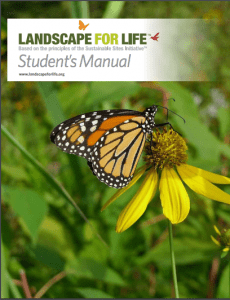Topics on this page:
Designing Polycultures for a Garden Setting
Designing Flower Gardens
Cornell Horticulture Distance Learning six-week workshops
Publications
Landscapes for Life
Designing Polycultures for a Garden Setting
The polycultures concept embraces growing multiple crops in the same space, mimicking the diversity of natural ecosystems.
Design Activity: Team up with family and friends to design garden polycultures for your backyards, or bring together a group to create a design for a place in your community.
Instructions: This video provides instruction for your polyculture design activity.
Materials: Large sheets of paper; pencils and/or markers for drawing; tape; and…
- Design template (pdf)
- Plant Cards (pdf)
- Plant Table (11 x 17 pdf)
Designing Polycultures for the Garden
View this presentation and handouts to learn more about polyculture as a community of multifunctional plants, animals, and fungi that is designed for interconnection. Handouts 1) Polycultures session notes (pdf) with resource links and 2) images of Polycultures PowerPoint slides for Polyculture Design (pdf)
Ecology for Garden Design
View this presentation and handouts to learn about how abiotic (non-living) factors, producers, consumers, and decomposers are all important parts of a garden ecosystem. Discover methods to improve the ecological health of your garden. Handouts 1) Ecology for garden design session notes (pdf) with resource links and 2) Ecology for Garden Design PowerPoint slides part 1 & part 2 (pdf)
top
Designing Flower Gardens
 Basic techniques
Basic techniques
How to use color
How to use texture
Cornell Horticulture Distance Learning six-week workshops
Horticulture Distance Learning website
Course descriptions:
- Introduction to Garden Design provides an opportunity for you to design your own garden. You will be studying and experimenting with the basic design procedures, learning about proper plant selection, and reflecting on the process as you learn.
- Permaculture: Fundamentals of Ecological Design provides an opportunity for you to build your knowledge about permaculture and ecological design by studying and experimenting with the basics.
- Permaculture: Ecosystem Mimicry provides an opportunity for you to cultivate ecological literacy by looking at the complex symbiotic relationships in both natural and cultivated systems while studying and experimenting with permaculture design.
- Organic Gardening provides a strong foundation in soil health and its impact on plant health, and a whole systems approach to gardening. The course also explores various techniques for growing different kinds of garden plants – annuals and perennials, food and ecosystem service plants. The topics and depth of information offered will help new gardeners learn the basics and feel comfortable getting started, while also offer more experienced gardeners the opportunity to expand their knowledge base.
Publications
Site Assessment for Better Gardens and Landscapes – Completing a comprehensive site assessment should be the first step when you purchase a property, make changes to a landscape, or expand a garden or landscape.
Livable Landscape Design This timeless publication will assist homeowners, landscape designers, nursery workers and contractors in the design process of the home landscape.
Working with Nature: A Guide to Shoreline Plants for New York’s Great Lakes Shorelines – A helpful guide for designing and restoring native vegetation to bring shorelines to a naturally functioning state.
Landscapes for Life

Landscapes for Life shows you how to work with nature in your garden you garden on a city or suburban lot, a 20–acre farm, or the common area of your condominium.
top


